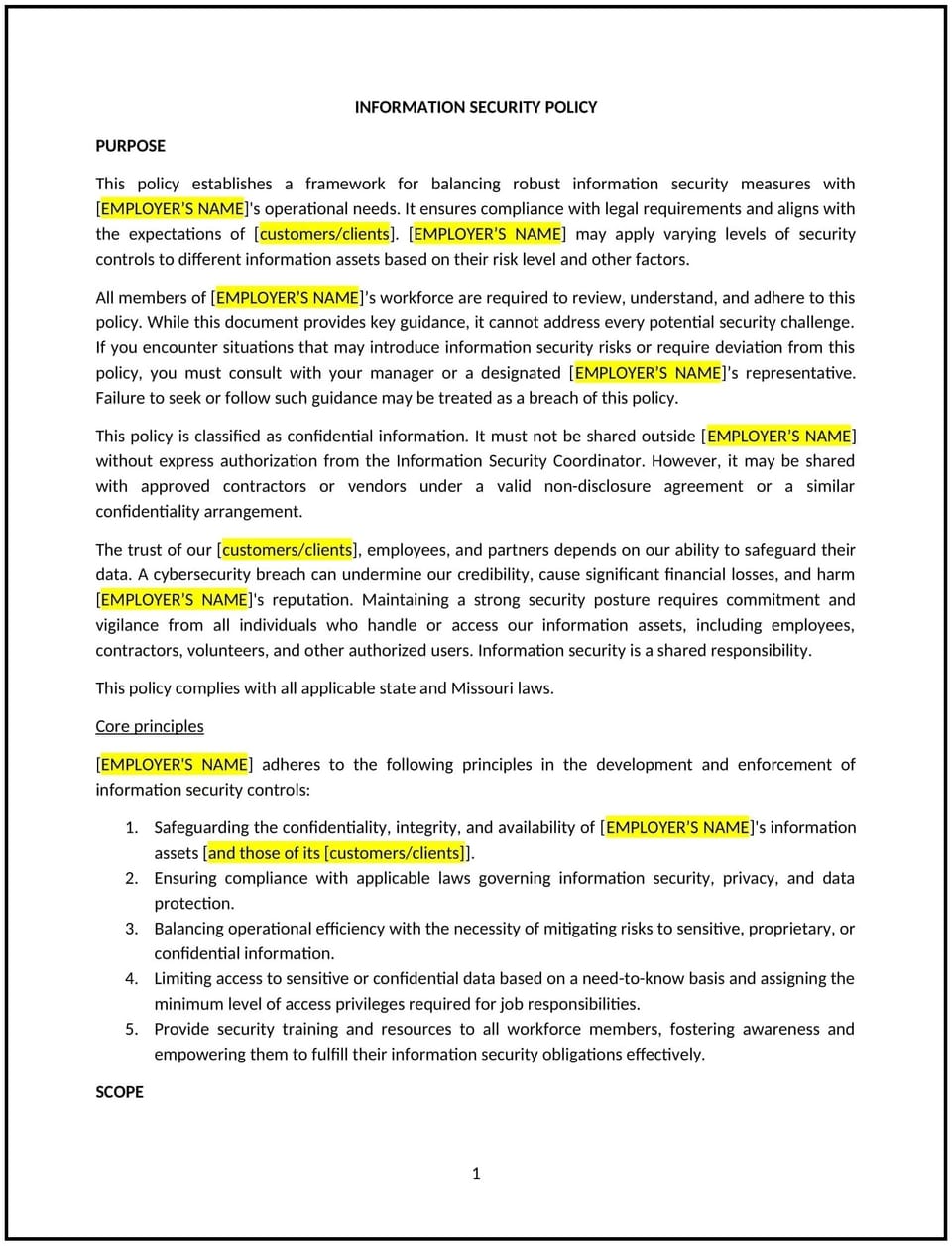Information security policy (Missouri): Free template

Information security policy (Missouri)
An information security policy helps businesses in Missouri protect sensitive company data, customer information, and intellectual property from unauthorized access, loss, or theft. This policy outlines the procedures for safeguarding digital and physical data, establishing access controls, and setting guidelines for using technology and handling confidential information. It aims to ensure that all employees understand their roles in maintaining data security and follow best practices to minimize security risks.
By adopting this policy, businesses in Missouri can protect their assets, enhance customer trust, and reduce the risk of data breaches and cybersecurity threats.
How to use this information security policy (Missouri)
- Define data security goals: Clearly state the business’s commitment to protecting sensitive information from unauthorized access, use, disclosure, alteration, and destruction.
- Implement access controls: Specify procedures for granting, modifying, and revoking access to company systems and data, ensuring that only authorized employees have access to confidential information.
- Establish guidelines for data handling: Outline how data should be handled, stored, and transmitted, including encryption requirements, backup procedures, and data disposal practices.
- Address cybersecurity risks: Set protocols for managing cybersecurity risks, including using firewalls, antivirus software, and intrusion detection systems to protect against external threats.
- Train employees: Offer regular training on information security best practices, such as recognizing phishing attempts, creating strong passwords, and reporting potential security breaches.
- Create incident response protocols: Define the steps employees should take if they identify a data breach or security threat, including reporting the incident and containing the threat.
- Monitor and audit: Establish procedures for regularly monitoring company systems, auditing data access, and reviewing security policies to ensure ongoing compliance and effectiveness.
- Review regularly: Periodically review and update the policy to reflect new threats, regulatory changes, and advancements in technology.
Benefits of using this information security policy (Missouri)
This policy provides several benefits for businesses in Missouri:
- Protects sensitive data: A robust information security policy helps prevent unauthorized access, data breaches, and cyberattacks, safeguarding valuable business and customer data.
- Reduces legal risks: By following best practices for data security, businesses reduce the risk of legal consequences, including fines and lawsuits, resulting from data breaches or non-compliance with data protection laws.
- Enhances customer trust: Demonstrating a commitment to information security helps build customer confidence, showing that the business takes data protection seriously.
- Prevents financial losses: Effective data security measures reduce the likelihood of financial losses due to fraud, theft, or downtime caused by cyberattacks.
- Improves operational continuity: By minimizing the risk of data breaches and cybersecurity threats, businesses can ensure smooth operations and avoid disruptions that could impact productivity or service delivery.
- Aligns with industry standards: An information security policy helps businesses meet industry regulations and standards, ensuring that they are in compliance with relevant laws regarding data protection.
Tips for using this information security policy (Missouri)
- Communicate the policy clearly: Ensure that all employees are aware of the policy and understand their roles in maintaining information security by including it in employee handbooks and offering regular training sessions.
- Implement strong access controls: Ensure that employees only have access to the data necessary for their roles, and review access regularly to prevent unauthorized use.
- Monitor systems continuously: Use monitoring tools to detect potential security risks, track data access, and identify suspicious activities in real-time.
- Regularly update security measures: Continuously evaluate and update security systems, including firewalls, antivirus software, and encryption methods, to address emerging threats and vulnerabilities.
- Provide secure data disposal: Establish guidelines for securely disposing of data and electronic devices, including methods like shredding physical documents and wiping hard drives.
- Encourage a security-aware culture: Foster a company-wide culture of security awareness, where employees are encouraged to report suspicious activities and follow best practices for data protection.
- Review regularly: Periodically review the policy to ensure it remains relevant to the business’s evolving needs, technological advancements, and changes in Missouri law or industry regulations.
Q: Why should businesses in Missouri adopt an information security policy?
A: Businesses should adopt this policy to protect sensitive data, reduce the risk of cybersecurity threats, enhance customer trust, ensure legal compliance, and safeguard company assets from potential threats.
Q: What is the purpose of access controls in the policy?
A: Access controls limit who can view or edit certain types of sensitive data, ensuring that only authorized personnel have access to information that is relevant to their role, reducing the risk of data breaches.
Q: What should businesses do to protect against cybersecurity threats?
A: Businesses should implement cybersecurity measures such as firewalls, antivirus software, encryption, and intrusion detection systems to protect against external threats, and regularly update these tools to stay ahead of new risks.
Q: How should businesses handle and dispose of sensitive data?
A: Businesses should establish secure methods for handling, storing, and disposing of sensitive data, including using encryption for storage and securely shredding or wiping physical and digital files when no longer needed.
Q: What should employees do if they suspect a data breach?
A: Employees should immediately report the suspected breach to their manager or IT department, follow internal procedures for containing the breach, and assist in any investigation or remediation efforts.
Q: How can businesses ensure employees follow the information security policy?
A: Businesses should provide regular training on information security best practices, establish clear consequences for non-compliance, and encourage employees to remain vigilant and report suspicious activities.
Q: How often should businesses review their information security policy?
A: Businesses should review the policy annually or whenever there are significant changes in technology, security risks, or legal requirements to ensure it remains effective and up-to-date.
This article contains general legal information and does not contain legal advice. Cobrief is not a law firm or a substitute for an attorney or law firm. The law is complex and changes often. For legal advice, please ask a lawyer.


